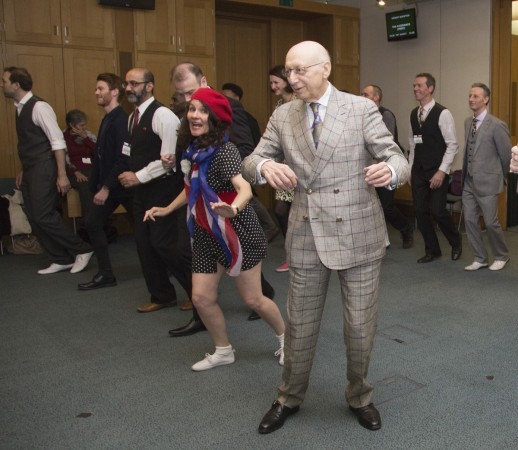A couple of weeks ago some dance instructors went to Westminster to coach MPs to shake their tushes for the cameras, while they promised to support a ‘dance manifesto’ for Britain. Since then the image of MPs twerking has stuck to the inside of my head like snail slime on my hands. I’ve scrubbed away with the mental Swarfega but I can still sense those lovely, lively honourable members of a certain age who feel they can best drum up public support for British dance by going onto the floor themselves.
You might be surprised that there exists an All-Party Parliamentary Group for Dance in Westminster at all. The 20 members include those grand inquisitors John Whittingdale and Margaret Hodge, although you’re more likely to find the group’s founders Sir Gerald Kaufman and Frank Doran jiving in public.
I’m split about all of this. Half of me winces – do we think hard-pressed British opera should flatter for MPs’ support by coaching them to emit a line or two of ‘Gott! Welch dunkel hier’? The other half of me gives a high five to the Dance UK lobby for their PR chutzpah. The likeable Doran, nine years secretary of the all-party group, has just been gonged for his championing of dance education in schools at this year’s National Dance Awards. A Good Thing.
And isn’t it generally a good thing that dancing brings everyone together, mass happy-clappies in Trafalgar Square, knees-ups at day centres, ballet exercises for football youth clubs, even lindy-hops for MPs? The all-party group’s mission statement is nice: ‘To promote dance as an art form and as an important element of healthy living and the fight against obesity; and to promote its educational and social benefits.’
That’s four separate missions in one sentence: art, health, education, social service – equal in rank, carefully not prioritised. And as the political climate prepares for further changes, most particularly in public funding on which dance is heavily reliant, we should expect that a large-scale dance conference organized by Dance UK in early April will be capable of asking and answering some hard questions. The four platforms of the performing dance world – theatre, street, ballroom and screen – will sit down with the enablers and funders to hammer out updates to the various areas of ‘British dance policy’ for the next five years.
Dance policy, manifesto – these are solemn words. From now to 2020, whatever the result of the election, the shift from public to private funding of minority entertainments will proceed, more or less bloodily. Unlike opera, dance has so many charming hats and wiles that its identity is unclear, and it has never addressed whether making money is a good or bad thing, or whether social imperatives should override art ones. You have a hard question? Here’s Darcey Bussell to take your mind off it. The fact that no one wants to say in the Dance Manifesto which hat’s on top is clear from the conference’s enormous range of sessions, all, surely, expecting affirmative action. I should add that I’m chairing one of the panels.
But I don’t think that a valuable dance policy can be made by conceding to every aspect of what everyone expects dance to do. For instance, my critic’s role is to focus on the ‘art’, and unarguably the entire body of British dance creativity since World War II has been more or less publicly funded. Yet no one takes the source of funding into consideration when thinking, ‘This is good.’ Politicians and taxpayer lobbies have a different measure of ‘good’ – they expect publicly funded art to show value for money, which means good box office performance or some other measurable contribution to the public weal. A person who only goes to see dance at Christmas looks for an affordable Nutcracker or Swan Lake experience, not caring whether it’s reach-me-down Russian or a UK company paying dancers a living wage. A regular at their town’s theatre wants lively variety, to feel pride in the arts in their locality. Meanwhile their theatre just wants to fill the seats.
A choreographer hopes to be supported in a long-developing creative career, permitted to make mistakes in order, hopefully, to make masterpieces. A dancer wants to be sustained through injury and retirement. A creative artist wants to experiment, and sod the box office. Diplomats need dance to be a British cultural asset abroad. An artistic director wants to hire the best dancers available. A parent wants their child’s expensive ballet training to lead to a job. A public funder wants dance to fix social prejudices. A broadcaster wants dance to be sexy and camera-friendly. A secondary school teacher sees the personal development that awkward kids get from the imaginative exercise of dance. A government wants dance to make fat people thinner, sick people healthier, and the awkward squad more controllable. Dance is identity/ art/ a bit of fun/ crime prevention. Dance is best left to the professionals; dance is best not left to the professionals.
Positively lovely as it is for dance to mean so many good things to so many eager people, this coming conference needs to generate hardheaded value judgements where at the moment the Dance Manifesto wants to keep all its children equally well mothered. A love-in with twerking MPs means nothing if priorities are not set. Politics is about choosing and acting, regardless of the tears shed.
Dance UK’s industry wide conference is on from 9-12 April at various London venues






Comments